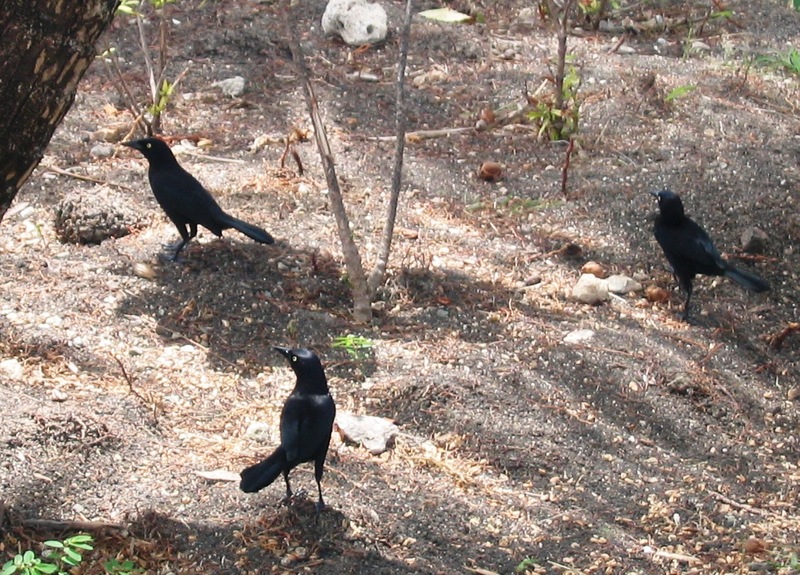|
| 질의: carib grackle | 결과: 1번째/10 | |
Carib Grackle (Quiscalus lugubris) - Wiki
| 제목: | Carib Grackle (Quiscalus lugubris) - Wiki
| |

| 해상도: 1127x810
파일크기: 458856 Bytes
촬영일: 2006:04:14 18:22:07
사진기: Canon PowerShot A70 (Canon)
F number: f/4.8
Exposure: 1/125 sec
Focal Length: 519/32
등록시간: 2007:01:28 23:55:42
|
Carib Grackle
From Wikipedia, the free encyclopedia
[Photo] Carib grackles on the ground.
The Carib Grackle, Quiscalus lugubris, is a New World tropical blackbird. It is a resident breeder in the Lesser Antilles and northern South America east of the Andes, from Colombia east to Venezuela and northeastern Brazil.
There are eight races, of which the most widespread is the nominate Q. l. lugubris of Trinidad and the South American mainland. This form was introduced to Tobago in 1905 and is now common there.
The adult male Carib Grackle is 27cm long with a long wedge-shaped tail, although the latter is not so long as with other grackles. Its plumage is entirely black with a violet iridescence, its eyes are yellow, and it has a strong dark bill. The adult female is 23cm long, with a shorter tail and brown plumage, darker on the upperparts. Young males are shorter tailed than adult males and have some brown in the plumage. Young females are very similar to the adult females.
The island races differ from the nominate form in size, plumage shade, especially in the browns of the females, and vocalisations.
The breeding habitat is open areas including cultivation and human habitation. This is a colonial breeder, with several deep, lined cup nests often being built in one tree. Two to four whitish eggs are laid. Incubation takes 12 days, with a further 14 to fledging. This species is sometimes parasitised by Shiny Cowbird, but is quite successful at rejecting the eggs of that species.
The Carib Grackle is a highly gregarious species, foraging on the ground for insects, other invertebrates or scraps. It can become very tame and bold, entering restaurants to seek food, normally feeding on leftovers. It will form groups to attack potential predators, such dogs, mongooses or humans, and at night it roosts colonially.
The Carib Grackle's song is a mixture of harsh and more musical ringing notes, with a bell-like tickita-tickita-tickita-ting and a rapid chi-chi-chi-chi being typical. The calls vary in dialect between islands and the bird usually fluffs up its feathers when calling.
http://en.wikipedia.org/wiki/Carib_Grackle
| The text in this page is based on the copyrighted Wikipedia article shown in above URL. It is used under the GNU Free Documentation License. You may redistribute it, verbatim or modified, providing that you comply with the terms of the GFDL. |
|
^o^
동물그림창고 똑똑전화 누리집
^o^
|
|

